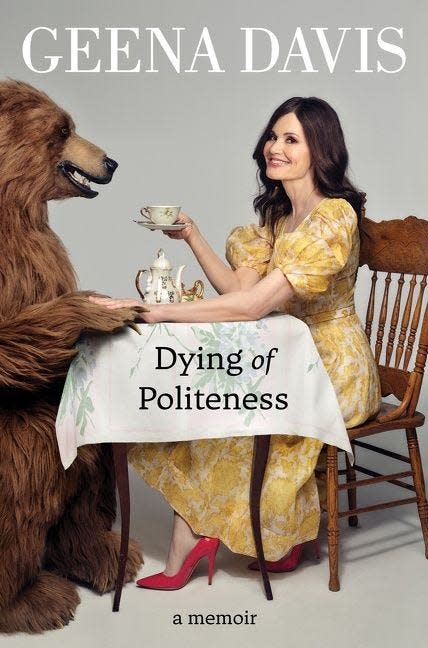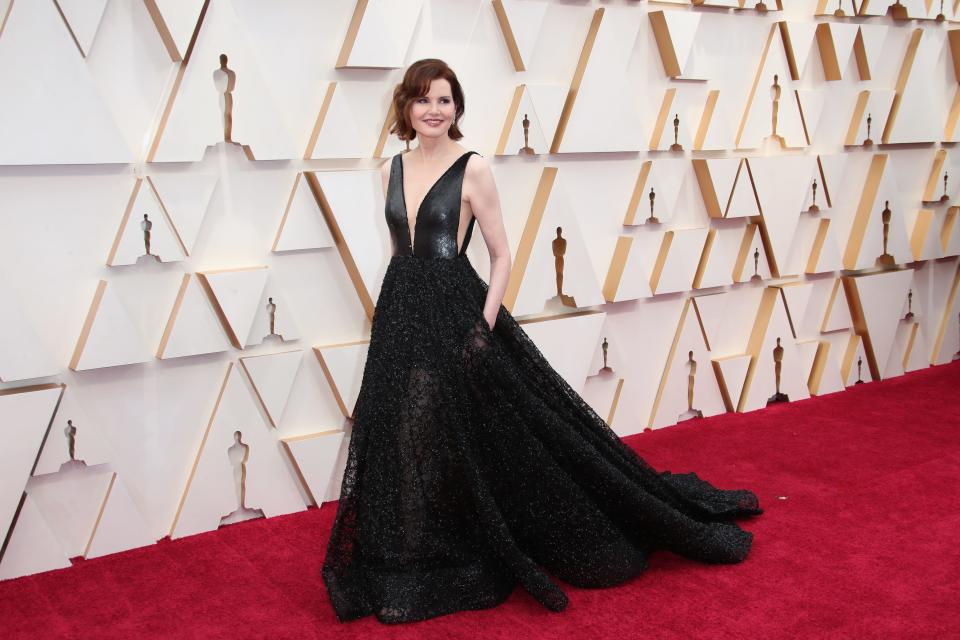Geena Davis reveals she was 'dying from shame' after Bill Murray screamed at her on film set
- Oops!Something went wrong.Please try again later.
- Oops!Something went wrong.Please try again later.
For many, over-politeness is merely inconvenient. For Geena Davis, it was almost fatal.
The actor, now 66, says she nearly died when she was 8 on a harrowing drive with her 99-year-old great uncle Jack. As Jack veered in and out of oncoming traffic, Davis and her parents declined to comment on his driving – even with a car fast approaching.
At the last moment, Jack swerved back in his lane, narrowly missing a head-on collision. Still, the experience sent Davis a clear message: Never say anything impolite, no matter the circumstances.
This struggle – of being too polite to stand up for oneself – serves as the through line of Davis' memoir, "Dying of Politeness" (HarperOne, 277 pp., out now). The Academy Award winner details her humble Massachusetts upbringing, starry film career, three marriages, extensive archery training and many, many instances of detrimental politeness along the way.
"Because of certain roles I played, people sometimes think I've been a badass my whole life or something, and that's not the case," Davis, who starred in "Thelma & Louise" and the action film "The Long Kiss Goodnight," says over Zoom.

Crippling politeness hasn't just landed Davis in awkward social situations: It's also kept her from speaking out about mistreatment.
In her book, Davis alleges she suffered harassment while working with Bill Murray on the 1990 film "Quick Change." She writes that the comedian pressured her into letting him give her a massage in a hotel suite during her meeting for her role. Another day, Murray screamed at her in front of more than 300 people on set while she waited for wardrobe.
"I was shaking all over, dying from shame," Davis writes, adding Murray intended "to make sure I knew my place."
USA TODAY has reached out to a representative for Murray for comment.

Davis says sharing painful memories with the world through her book gives her a "strange" feeling.
"It's much different than a movie that's going to come out that you were in, because it's not a character, it's me," she says. "I can't even remember writing it in a way."
Davis also writes of a traumatic childhood experience: When her neighbor molested her when she went to deliver him his newspaper.
Like others who have suffered similar abuse, Davis says she didn't grasp the gravity of what happened until she was an adult.
"You don't realize how bad it is at the time," she says. "You don't let yourself realize what has happened to you, and it's only later you go, 'Wow, wait a minute. That was horrible.'"
Davis' mother confronted the neighbor about the incident, but no police report was ever filed.
"My big lesson in life was you can't ever complain about anything," Davis says. "You can't draw that kind of attention to yourself by complaining about something. So I didn't talk about it, but I wanted to talk about it."
A formative friendship helped teach Davis to speak up for herself – her bond with her on-screen partner-in-crime and "Thelma & Louise" co-star Susan Sarandon, a woman who, Davis writes, "very simply and clearly said what she thought."
Geena Davis' 'Dying of Politeness,' comics mastermind Alan Moore's 'Illuminations': 5 new books
Davis has also since spoken out against Hollywood inequity through her organization, the Geena Davis Institute on Gender in Media, which strives to increase media diversity.
The research her institute conducts hits close to home for Davis, who says she experienced Hollywood ageism and sexism firsthand when her acting opportunities plummeted as soon as she turned 40.
A recent study by her institute found that characters over 50 made up less than a quarter of all characters in top-grossing domestic films and popular television from 2010 to 2020. Of those characters, men made up 4 out of 5 of them in film, 3 out of 4 in broadcast TV and 2 out of 3 in streaming TV.
"That's an incredibly small slice of the pie for everybody 50 and over that's female," Davis says. "I thought, 'Well, it's not going to happen to me, because I got all these great roles.' I was sure that things were going to change before I got to 40, but they didn't."
Geena Davis recalls director who made her sit on his lap: 'I didn't know you could say no'
The key to becoming the strong woman she is now is speaking her mind sooner rather than wishing she had later.
"That should be absolutely natural for everybody – to be able to just say what they think," Davis says. "So many of us don't ever get there and really live authentically in the moment. My life's goal was to close the gap between when something happens and when I react authentically to it."
It's a goal she hopes readers will want to strive for after reading her book.
"Most everybody actually can relate to feeling like they're not living authentically and that they're hiding parts of themselves in order to get approval from someone or from the world," she says. "At least through my experience, it's possible to get past that, no matter how long it takes."
Geena Davis says Hollywood could achieve parity: 'Cross out' men in scripts and sub women
This article originally appeared on USA TODAY: Geena Davis reveals Bill Murray harassment left her 'dying from shame'

